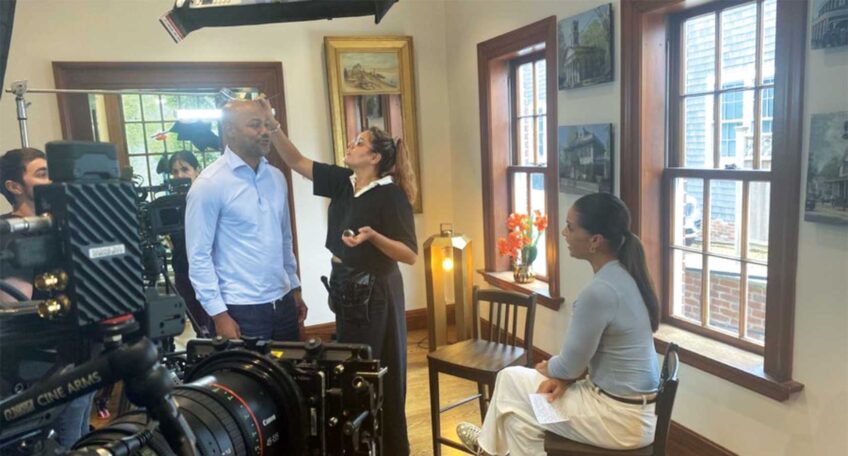
From ditch digger to environmental entrepreneur, Brian Chapman has grown his business where he grew up. He now hopes his story will inspire others in Lowell. The 52-year old says he’s lived his life and started his business with a simple philosophy.
“When I started, my mission statement was … failure is not an option, from day one,” Chapman said, “Once you tell yourself failure is not an option everything else unfolds.”
Chapman is the founder and CEO of Mill City Environmental a company that specializes in environmental remediation — cleaning hazardous waste from soil and water and providing other waste management services. He started the company in his hometown of Lowell in 2001 after spending 15 years in the environmental services business.
Chapman’s love for the environment started with his very first job, digging holes for a local archaeologist. That boss became a mentor who encouraged the teen to pursue geology at UMass Amherst.
After graduation, his passion for math and science and his desire for adventure nearly landed Chapman in the cockpit of a fighter jet. After passing nearly every test to become a Naval Aviator, he failed the color-blindness test. That’s when Chapman decided to return to his roots, and took a job with an environmental company in Boston. In 1986, Chapman’s first job with Clean Harbor gave him crucial experience and a chance to make connections that would pay off later in life. In March of 2000, looking for new opportunities and advancement Chapman moved to Foster Wheeler. His experience, skills and network grew.
In November of 2001, Chapman ventured out on his own and started Mill City Environmental. He began with no projects lined up. But fortunately, a college called within a month, offering Chapman his first job. MCE would only grow after that, with Chapman reaching out to friends, colleagues and former employers who remembered his work and were willing to offer him projects.
“Without those business relationships I probably wouldn’t have started Mill City,” he said. “I knew I would at least be able to get an audience with people, talk with people who are decision makers. To an entrepreneur entering whatever market segment they are going to enter, it’s about those key relationships.”
The story sounds much easier that it really was. Before starting a multi-million dollar company that employs 46 people, being recognized by Fortune Magazine last year and the Initiative for a Competitive Inner City this year, Chapman was just a kid from the Merrimack Valley.
“I’m from Centerville. Centerville is actually a great neighborhood,” Chapman said, “I had just wonderful memories as a kid growing up in that part of Lowell. … You played baseball, you played football. Riding bikes, feeling safe … basically the Americana that everybody knows. You come home when the streetlights are on, nobody worries about you. That was the type of environment I grew up in. So that fostered a little independence.”
Growing up, just as in business, Chapman says he faced challenges early on. The Chapmans were only the second black family in the neighborhood in 1969. But the then-7-year-old and his older brother were determined to enjoy their new home.
“Rough start, but kids are kids,” Chapman said. “There were a couple of families that [had a] fear of the unknown.. Even those people… they relaxed after a number of years. When you look back in retrospect, some of those kids that gave us the hardest time are now probably close friends.”
It was a similar experience in the business world. Chapman stands as one of only a handful of minorities in environmental cleanup. He says some treated him like an outsider when he ventured out on his own. But Chapman credits his success to perseverance.
“The construction industry, especially in the Northeast, is predominantly white males,” he said. “What I call the ‘old boy network’ of subcontractors was there. So I didn’t have an entry into that club. That was the toughest hurdle I had to get through. Getting assistance from the state Office of Minority, Women Business Assistance, that was the access door.”
Once in the door, Chapman relied on his track record and the personal relationships he built during 15 years in the business before starting Mill City.
Another break Chapman enjoyed was the ability to finance his company himself. He cashed in stock from his previous job at Clean Harbor to fund his startup. His wife was also very supportive, allowing him to begin his first year of business without the pressure of a loan looming over his head.
“I purchased a number of shares of Clean Harbor stock,” he said. “That was the initial capital to get things going, with additional help from Mrs. Chapman who was then working very diligently. It was basically all of our own money. That gave me the ability to be a little more flexible and go after jobs in the beginning, which is very helpful. When you start off with a loan, not only do you have your rent to pay but now you have a note you have to deal with every month. This puts a new stress on most entrepreneurs.”
Today, Chapman juggles dozens of projects, operates in seven states and works with private, state and federal organizations. Chapman also credits his success to finding his niche. After years of success as a subcontractor, he says ego and ambition almost pushed him to grow the business to become a prime contractor. But after assessing the risk, the potential headaches and the possible rewards he decided to continue as a subcontractor
Now with his business firmly established and growing, Chapman has more time to spend with his wife, son and daughter. He makes it a point to try to hire people from the community. He also spends a lot of time giving back to the community. Next year he begins his term as president of the Boys and Girls Club of Greater Lowell. It’s an organization he spent countless hours with in his youth.
“If I can do something that can be taken as a model of a kid who grew up in the city, started his own company, has done well, I can inspire other kids to think about being an entrepreneur,” he said. “And that in itself is beneficial. It’s all about kids coming up having opportunity and seeing people doing things that are positive.”
“You have to keep your nose to the grindstone and continue to work hard,” he said. “Hard work does pay off at the end of the day. For people of color, there are more obstacles than there are for everyone else. But you know that going in. Don’t let that get you down.”






